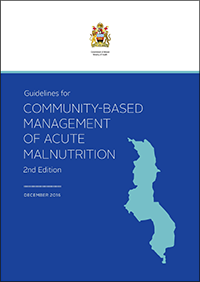 A substantial proportion of Malawi’s children under 5 who are diagnosed with acute malnutrition develop severe acute malnutrition (SAM) with medical complications. In 2006, the Ministry of Health (MOH) adopted the Community-based Management of Acute Malnutrition (CMAM) approach to ensure maximum coverage, timeliness, access, and provision of appropriate care to those in need, and developed an interim set of national guidelines. Interim national guidelines were developed in 2006. The first edition of Malawi CMAM Guidelines was issued in 2012.
A substantial proportion of Malawi’s children under 5 who are diagnosed with acute malnutrition develop severe acute malnutrition (SAM) with medical complications. In 2006, the Ministry of Health (MOH) adopted the Community-based Management of Acute Malnutrition (CMAM) approach to ensure maximum coverage, timeliness, access, and provision of appropriate care to those in need, and developed an interim set of national guidelines. Interim national guidelines were developed in 2006. The first edition of Malawi CMAM Guidelines was issued in 2012.
The MOH has now issued the second edition of its Guidelines for Community-Based Management of Acute Malnutrition. Working with FANTA, UNICEF, and the World Health Organisation (WHO), the MOH has aligned its CMAM approach with WHO’s 2013 recommendations, as well as with global emerging issues, practitioner experience, and new research findings. Intended to standardise and improve the quality of CMAM service delivery in Malawi, the updated guidelines also contain the latest recommendations on feeding infants and young children up to 24 months.
In recognition that its CMAM service delivery has experienced successes and challenges, the MOH, in collaboration with FANTA and other partners, also has produced a new National Community-Based Management of Acute Malnutrition (CMAM) Operational Plan for 2017–2021, which is based on evidence from past achievements, lessons learned, and an analysis of implementation gaps. The five-year plan outlines what needs to be done to improve the quality of CMAM service delivery and provides guidance on monitoring and evaluation of the plan’s implementation.
To complement the revised guidelines and 5-year operational plan, the MOH also developed a set of monitoring and reporting forms and tools. In addition to the guidelines, a set of job aids developed for frontline healthcare workers offering CMAM services was also revised and now includes competency standards for the management of severe and moderate acute malnutrition.


